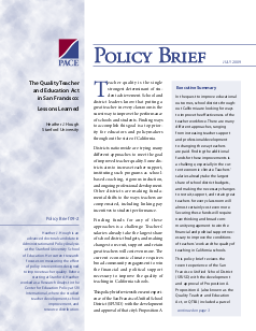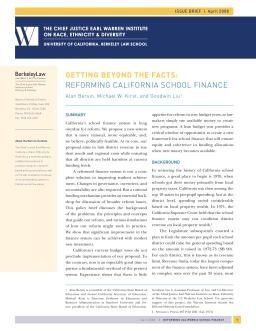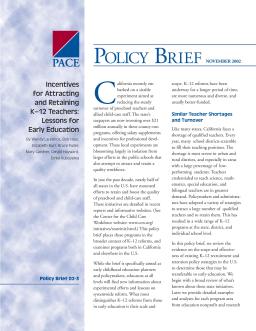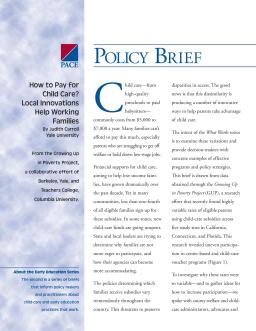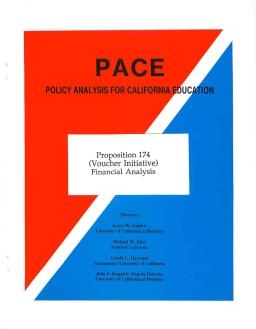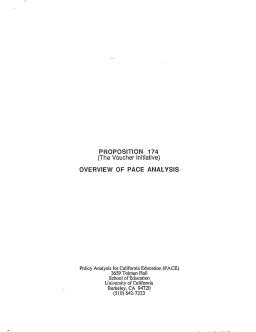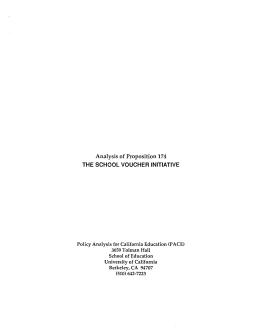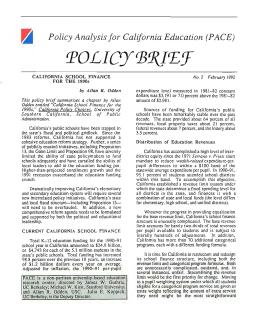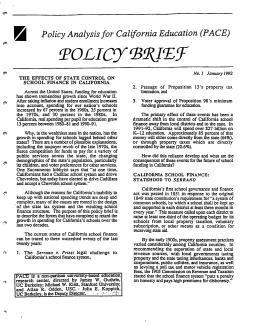Lessons Learned
Published
Summary
This policy brief examines the recent development and approval of Proposition A in the San Francisco Unified School District, which included a parcel tax for increasing teacher salaries, introducing flexibility to the salary schedule, and strengthening accountability for teacher performance. The author describes how the district and union worked together to increase compensation and align school district goals with teacher salaries.
Reforming California School Finance
Published
Summary
This policy brief proposes a more rational and equitable school finance system for California that links district revenue to student needs and regional costs. The proposal aims to ensure that all districts are held harmless at current funding levels while providing essential backdrop for broader reform issues. The brief discusses the problems with the current finance system, the principles and concepts that guide the reform, and simulations of how it might work in practice. The report shows that significant improvement in the finance system can be achieved with modest new investment.
Lessons for Early Education
Published
Summary
This policy brief discusses state initiatives in the US aimed at retaining and improving the quality of preschool and childcare staff, with a focus on California's $21 million annual investment. While K-12 reforms have been underway longer and are usually better-funded, early childhood education policymakers and educators will find valuable information about experimental efforts and lessons on systemwide reform.
California Families See Little Growth in Child Care Centers
Published
Summary
The rise in the number of working mothers has led to a greater need for childcare, and investments have been made to support early education. California's childcare programs have seen a surge in funding, including a tax credit program. The policy brief aims to explore if the increased funding has improved access to quality childcare centers and preschools for California families.
Local Innovations Help Working Families
Published
Summary
Many low-income families struggle to afford childcare, even with financial supports. Less than one-fourth of eligible families sign up for subsidies in many communities, leading to disparities in access. The What Works series examines effective programs and policy strategies to increase participation in childcare subsidy programs. The report draws from the Growing Up in Poverty Project, which found highly variable rates of eligible parents using childcare subsidies across CA, CT, and FL. Possible reasons for low utilization and present novel strategies to increase participation are discussed.
Financial Analysis
Published
Summary
The Californians will vote on Proposition 174 which will amend the state constitution to establish "scholarships" for kindergarten to 12th-grade schooling. These new schools will be publicly funded but may have privately selected governing boards and religious orientation. It is unclear whether they will be public or private schools. The paper attempts to reduce uncertainty regarding the financial consequences of the proposed voucher plan and address questions about public costs and possible cost savings.
Overview of PACE Analysis
Published
Summary
PACE has analyzed the financial, legal, and social ramifications of Proposition 174, the school choice initiative, so as to provide Californians and policymakers with accurate, unbiased information. This packet contains important questions and answers about the initiative, summaries of PACE's financial analysis and polling report, and background information on PACE and its directors.
The School Voucher Initiative
Published
Summary
The "Parental Choice in Education Initiative" or Proposition 174, will be voted on by Californians on November 2, 1993. PACE has conducted an analysis of the initiative's provisions to provide objective information to policymakers, parents, educators, and the public. PACE is not taking a stance on the initiative but has produced additional materials related to the initiative and the issue of school choice. These materials are listed in the attached report on school choice.
Published
Summary
California's education system has suffered from a lack of cohesive reform strategy since 1983 due to political and fiscal gridlock, and initiatives like Proposition 13 have limited state and local leaders' ability to fund schools adequately. To improve the system, California needs to overhaul its fiscal structure and formulate a new comprehensive reform agenda with the support of both political and educational leadership.
Published
Summary
Funding for education in the US has grown significantly since World War II, but in California, spending for schools has lagged behind other states. Reasons for this include the taxpayer revolt of the late 1970s, competition for funds, changing demographics, and voter preferences. Many of the causes are rooted in the state tax system and school finance structure. Californians used to have a top school system but now have a lower-quality one due to these factors.
